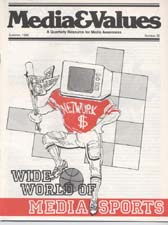WOMEN: Sexism, Hype Spoil Pleasure of Sport
|
This article originally appeared in Issue# 36
|
When I analyze my feelings towards sports events. I suffer from a degree of ambivalence. On the one hand, the energy and enthusiasm of the spectators, the beauty of the human body in a well-disciplined play of movement, the art of the game and the sheer fun of it all relax and re-create me.
On the other I can't help thinking how the hype and the hoopla of media sports have invaded our homes and holidays, our relationships, our leisure and quiet time. It's an artificiality that has taken over the human spaces of our lives.
This discomfort came upon me gradually. First as a member of a sports-minded family and later as a high school teacher who never missed a home game, I appreciated the values of sports.
But while teaching I came to realize that no other high school activity — academic, scientific or artistic — carried the same kind of attention and affirmation as that given to male athletics. The "young jocks" were kings surrounded by their admiring court of cheerleaders and homecoming queens.
Young women's sports, if they existed at all, were hardly recognized by anyone except the coaches and the players.
This emphasis on masculine accomplishment is reflected in the ambience that surrounds media sports today — the excessive masculinity of the contact sports, the semi-nude, ever-smiling women cheering the men along, the artificial excitement in the commentator's voice.
Our society's emphasis on money as a major measure of personal success is also reflected in the salaries paid to athletes. Fifty-six major league baseball players make more than $1 million each, with compensation for 658 players avenging over $400,000!
Football players receive even higher salaries. The intimate relationship between sports, media and advertising has created this inflated scale. But such salaries in the face of the growing poverty in our society, especially among women, children and the elderly, are a scandal. In the face of the poverty in the world, they speak only of the selfishness and superficiality of our culture.
The sports I see on the media are a far cry from the sports I knew in my youth. The sports I witnessed when I taught were a faint glimmer of the problem that has taken over our lives. Today, I am a "conscientious objector" to the world of sports that advertising and the media have spawned in our society.



